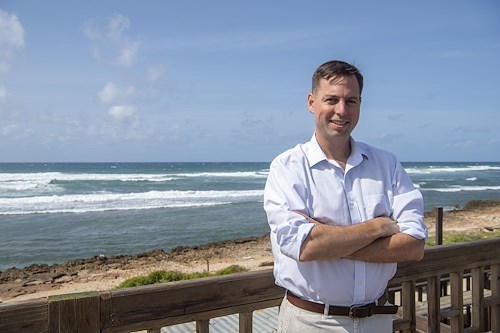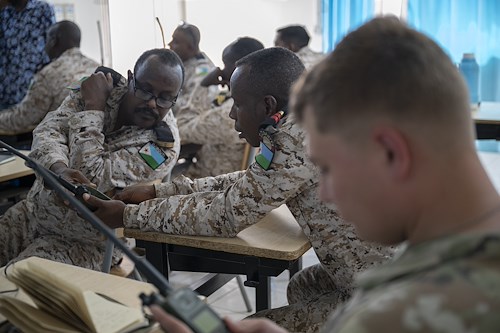Gallery contains 3 images
×
Photo 1 of 3
Combined Joint Task Force - Horn
Joseph R. “Jay” Truesdale is a U.S. Navy reservist lead at Military Assistance Group - Somalia (MAG-S), which reports directly to Joint Special Operations Task Force - Somalia. MAG-S coordinates operations and activities with Somalia’s chief of defense force and African Union Mission in Somalia (AMISOM) forces. (U.S. Air Force photo by Senior Airman Kristen A. Heller)
Photo by: Senior Airman Kristen Heller
Photo 2 of 3
Combined Joint Task Force - Horn
U.S. Army Col. Eric L. Hefner, serves as director of the Military Coordination Cell (MCC) in Mogadishu, Somalia. The MCC coordinates the efforts of the international community to build the Somali National Army and enhance security in Somalia. (U.S. Air Force photo by Senior Airman Kristen A. Heller)
Photo by: Senior Airman Kristen Heller
Photo 3 of 3
Combined Joint Task Force - Horn
U.S. Navy Lt. Cmdr. Jason K. Looper is the plans officer of the Military Coordination Cell (MCC) in Mogadishu, Somalia. The MCC coordinates the efforts of the international community to build the Somali National Army and enhance security in Somalia. (U.S. Air Force photo by Senior Airman Kristen A. Heller)
Photo by: Senior Airman Kristen Heller
MOGADISHU, Somalia – Tucked away in an unassuming building on Mogadishu’s ocean-side International Campus, the United States’ Military Coordination Cell (MCC) nonetheless plays an oversized role in leading the international community’s efforts to enhance security in Somalia.
Initially created in 2013 by U.S. Africa Command (AFRICOM) as a three-person unit tasked with establishing coordination between the African Union Mission in Somalia (AMISOM) and U.S. forces in the country, the MCC saw its mission expand following 2017’s London Conference on Somalia when then-U.S. Secretary of Defense James N. Mattis agreed that the U.S. would lead the Comprehensive Approach to Security Strand 2A (CAS 2A).
The Comprehensive Approach to Security is a framework for international commitments under five areas of work, including enabling effective AMISOM operations and a transition to Somali led security; development of Somali national security institutions; support to the Somali government’s stabilization plans and community recovery / state authority; countering and preventing violent extremism; and enhancing international partners’ support. Strand 2A specifically refers to the Federal Government of Somalia Ministry of Defense and the Somali National Armed Forces.
U.S. Army Col. Eric L. Hefner serves as director of the MCC. “The MCC works for the U.S. Ambassador (Donald Y. Yamamoto) in building the Somali National Army. He is the internationally agreed co-chair of the CAS 2A process,” Hefner said. “As the ‘connective tissue’ in the international community, the MCC provides coordination of multiple international efforts to build the SNA.”
Today, the MCC has expanded to include the Military Assistance Group – Somalia (MAG-S), Office of Security Cooperation (OSC), and two British officers seconded from Operation Tangham, the UK Mission in Somalia. As U.S. Navy Lt. Cmdr. Jason K. Looper, MCC plans officer, explained, “MAG-S is the piece that reports directly to Joint Special Operations Task Force – Somalia (JSOTF-SOM). The capacity and institutional building piece, for which the OSC and our two UK officers play a major role, is vital to the future of Somalia transition.” Hefner pointed out that the British officers, both lieutenant colonels, serve as ground combat planners, providing the MCC with a capability that it otherwise would not have.
As the MCC has grown from three personnel to approximately 20, Combined Joint Task Force – Horn of Africa (CJTF-HOA) has become the major force provider in support of the positions that were not included in the original AFRICOM execute order establishing the cell. The increased number of personnel has proven critical in maintaining the relationships and responsibilities that the MCC has taken on and has enhanced AFRICOM’s desired effects in Somalia while providing support to AMISOM, the SNA and the multitude of international partners operating in the East African nation.
Joseph R. “Jay” Truesdale, a Navy reservist lead at MAG-S, noted that the international community in Somalia functions as a quasi-coalition, albeit one without many of the formalized arrangements familiar in other military theaters. That lack of a formal coalition is what makes the working environment “interesting and challenging,” according to Looper. “Everyone comes together and coordinates their respective efforts in order to advance Somalia toward sustained security,” he said.
While there is no set agreement to aid one another, the various international forces work toward a common goal and support one another when planning conflicts arise. “When our planning sessions identify critical needs, many international partners deliver specific equipment and training programs to fill those needs,” Looper said. “Being able to create consensus on priorities for stabilization and have international partners step up to execute different parts of that plan in concert is critical to success in Somalia.”
Truesdale agreed, saying, “Effective coordination is essential for Somalia to achieve its strategic reform objectives while also fighting in the field against al-Shabaab.” He said that the MCC works in conjunction with the various international partners to coordinate closely with senior personnel from the Somali National Armed Forces and senior federal security officials.
Hefner described the European Union (EU) contribution as vital in Somalia because the EU funds AMISOM, which, in turn, provides combat power in support of the Federal Government of Somalia. AMISOM is “a capable and competent force that makes a significant difference in holding al-Shabaab and other anti-Federal Government of Somalia elements at bay.”
Truesdale offered praise for AMISOM as well. “Drawing from troop contributing countries across East and Central Africa, AMISOM soldiers are motivated to serve on behalf of the Somali people, their own nations, and the international community,” he said.
The Turkish intergovernmental task force based at Camp TURKSOM provides significant funding and training, and the European Training Mission – Somalia (EUTM-S) is a valuable partner because it provides much of the training capacity in the international community and has the combat power to assist the Somali National Army. Hefner also cited the “Special Relationship” between the U.S. and the UK, saying that he works very closely with the commander of the UK contingent, sharing information and ideas.
“Most important is the collaboration and cooperation of the different elements here to assist the SNA. We all have our own caveats and missions, but everyone works hard to synchronize those efforts because we all see that is the best way to get the most from our efforts,” Hefner said. He added that the international partners are not looking for “assistance” from the U.S. but “coordination.”
MAG-S coordinates operations and activities with the SNA’s chief of defense force and AMISOM forces as part of developing the SNA’s capability to conduct combined operations. Coordinating and mentoring the SNA Reform Process in support of the U.S. Embassy links the Somali National Armed Forces, the Somali General Staff and the Ministry of Defense together, the intent of which is to strengthen civilian oversight of the military, establish systems of accountability, and further professionalize the Somali National Armed Forces.
Truesdale said that the United States also provides extensive support to the SNA’s light infantry strike brigade known as the Danab. “From close interactions with its leaders, I greatly admire the Danab’s active operations against our common adversary, al-Shabaab, as well as its ability to address essential non-operational efforts, such as building organizational capacity.” Noting that many Danab officers are younger than their U.S. counterparts, Truesdale said that the Somali officers “bear complex leadership responsibilities not often expected of Western officers at the earliest stages of their military careers,” adding, “Their personal stories of courage and commitment are especially striking considering Somalia’s difficult operation conditions and its uncertain future.”
One of the Danab’s officers who works regularly with MAG-S, First Lieutenant Mohamud, spoke for the brigade when he said, "We appreciate the advice, assistance, and training provided by U.S. partner forces to professionalize the Danab light infantry brigade, as well as the broader Somali armed forces. We share a common goal to fight violent extremist organizations in Somalia and East Africa to bring security and safety for our citizens."
Despite the close coordination and cooperation, working in Somalia presents unique challenges due to the decades of conflict that has destroyed infrastructure and held the country back from fundamental social and governmental services. As Looper summarized, “There are no out-of-the-box solutions… Progress is happening, but because we are building their foundation, not just improving what exists, we must have strategic patience in understanding the pace of that progress.”
Asked about his top achievements as he nears the end of his tour as director of the MCC, Hefner offered praise for his soldiers and sailors. “I have been privileged to lead a constantly changing team of professionals who apply their own intellect, experience, and work to advancing our mission of ‘build the SNA.’ This team has enabled the SNA to develop in its ability to ‘organize, train, man and equip the SNA force.’”













